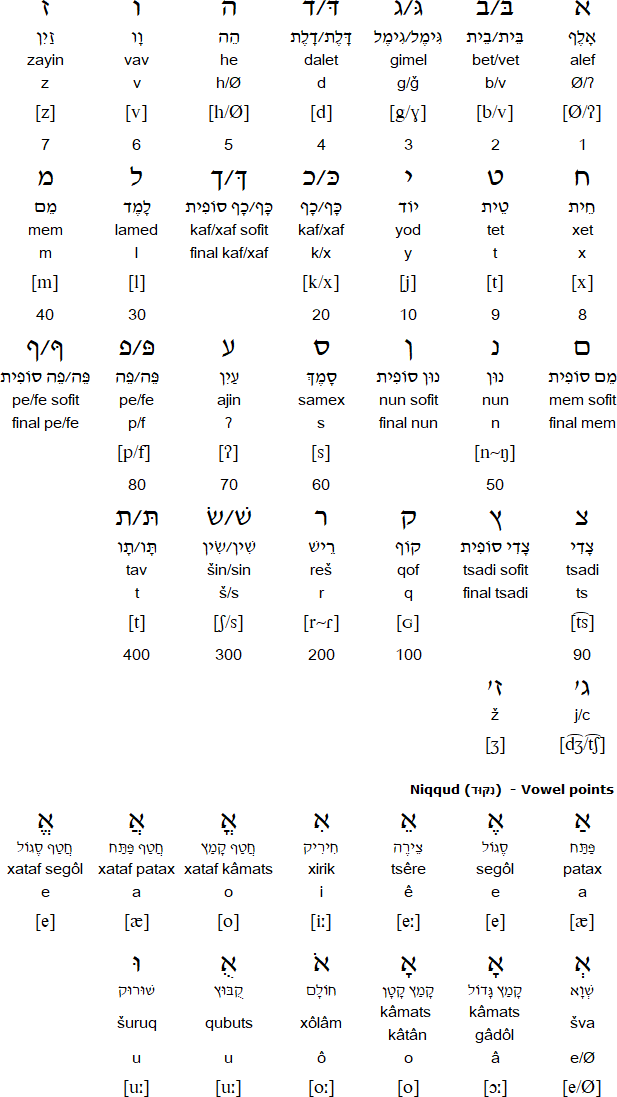Judeo-Persian is a group of Persian dialects that were originally spoken by Jews living in Iran, and are now spoken mainly in Israel. In 2018 there about 55,000 native speakers of Judeo-Persian in Israel, and a few in Iran. Judeo-Persian is written with the Hebrew alphabet, and contain numerous words borrowed from Hebrew and Aramaic.
Speakers of Judeo-Persian call their language פארסי (Fārsi). Others call it dzhidi, zidi, judi or jidi, which means "Jewish" in a derogatory way.
Jews lived in Persia from the time of the Achaemenid Empire (550-330 BC), and over time Persian became their everyday language. From 323 AD they were obliged to speak either Hebrew or Persian.
Literature in Judeo-Persian first appeared in the 8th century AD, and includes religious works, such as religious poetry and biblical commentaries, and historical texts. The most famous Judeo-Persian poet is Mowlānā Shāhin-i Shirāzi, who lived in the 14th century AD and wrote epic poems based on the Bible.

Download an alphabet chart for Judeo-Persian (Excel)
אי פ דר מא כה דר אסמאן, פאך באשד נאם תו, ביאיד פאדשאהי תו, שוד חואסת תו המגנאנכה דר אסמאן ניז דר זמין, בדה מארא אמרון נאן כפאף רוז מארא, ודרכדאר מארא כנאהאן מא גנאנכה מא ניז מיגדשרים ערמאן מארא, ודר אזמאיש מינדאז מארא, ליכן חלאץ כן סארא אז שריר. ברי אנכה מלכות ונירומנדי ועטמת אז אן תוסת כנון ותא אבד אבד לאבד.
Ey padere mâ kih der âsmân, pâk bâšed nâm tu, beyâyed pâdšâhi tu, švad huste tu hemžunânkih der âsmân niz der zemin, bideh mârâ amruz nân kefaf ruz mârâ, vudarxudâr mârâ konâhân mâ žunânkih mâ niz migudšarim ʔormân mârâ, vudar ozmâyiš minedâz mârâ, likin xalâts kun mârâ ez šerire. Baray ankih melkut vunirumendi vatstemet ez on tust kanun vuta ebed ebedi lebedi.
Our Father, who art in heaven, hallowed be thy name; thy kingdom come, thy will be done on earth as it is in heaven. Give us this day our daily bread, and forgive us our trespasses, as we forgive those who trespass against us; and lead us not into temptation, but deliver us from evil. For the kingdom, the power and the glory are yours now and for ever.
Source: Nouvelle méthode pour entrer dans le vraisens de l'écriture sainte. Philippe Du Contant de la Molette
Details provided by Michael Peter Füstumum
Information about Judeo-Persian
https://en.wikipedia.org/wiki/Judeo-Persian
https://update.lib.berkeley.edu/2020/04/13/judeo-persian/
https://www.ancientjewreview.com/articles/2015/8/19/on-judeo-persian-language-and-literature-with-four-text-samples
https://shervinfarridnejad.wordpress.com/irano-judaica/judeo-persian/
https://www.iranicaonline.org/articles/judeo-persian-viii-judeo-persian-language
https://www.ethnologue.com/language/jpr
Aramaic, Bukhori, Domari, Hebrew, Jewish Neo-Aramaic, Judeo-Arabic, Judeo-Persian, Juhuri, Knaanic, Ladino, Mozarabic, Yiddish, Yevanic
Avestan, Bactrian Baluchi, Bartangi, Dari, Gilaki, Hazaragi, Ishkashimi, Judeo-Persian, Juhuri, Khufi, Kumzari, Kurdish, Luri, Mazandarani, Munji, Ossetian, Ormuri, Oroshor, Persian, Parthian, Pashto, Rushani, Sanglechi, Sarikoli, Shabaki, Shughni, Tajik, Talysh, Tat, Wakhi, Wanetsi, Yaghnobi, Yazghulami, Yidgha, Zazaki
Page last modified: 20.08.23
[top]
You can support this site by Buying Me A Coffee, and if you like what you see on this page, you can use the buttons below to share it with people you know.

If you like this site and find it useful, you can support it by making a donation via PayPal or Patreon, or by contributing in other ways. Omniglot is how I make my living.
Note: all links on this site to Amazon.com, Amazon.co.uk
and Amazon.fr
are affiliate links. This means I earn a commission if you click on any of them and buy something. So by clicking on these links you can help to support this site.
[top]